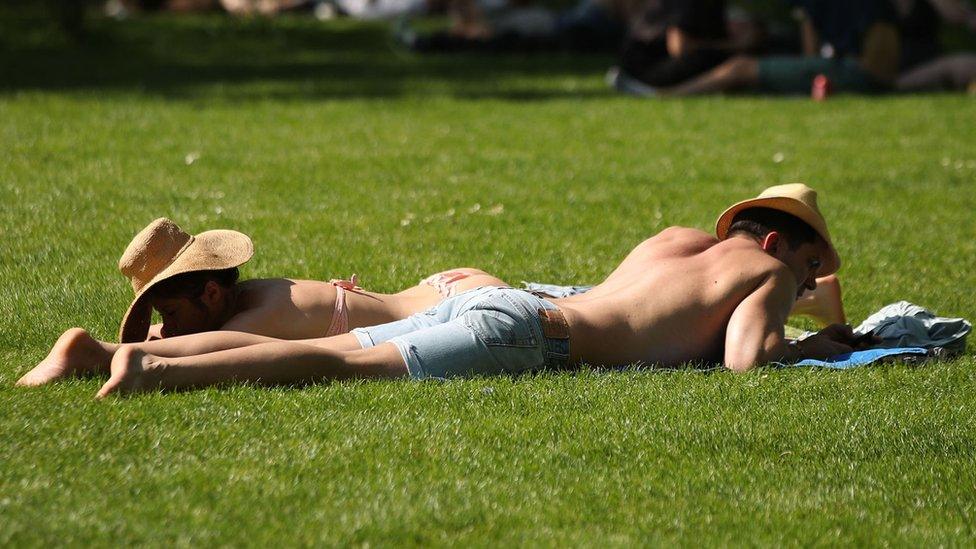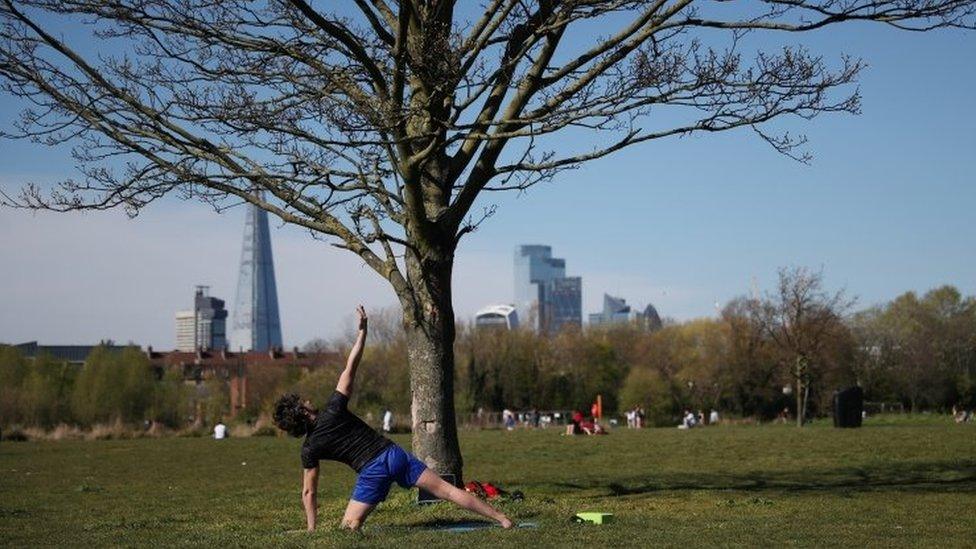Coronavirus: Should outdoor exercise be banned and parks closed?
- Published

People "need parks" and councils must keep them open, Local Government Secretary Robert Jenrick has said.
But does shutting more of them and banning outdoor exercise help stop the spread of coronavirus?
Why have some parks closed and some not?
Closing parks and recreational areas is up to local authorities, and some took that step after people started congregating in warmer weather, despite social distancing measures.
Many have since reopened, but Middlesbrough's mayor Andy Preston says those in his town will stay shut.
In a post on social media, external, Mr Preston said parks themselves were not dangerous, but "people gathering and mixing inappropriately could be deadly".
Elsewhere, London's Lambeth Council closed Brockwell Park on the first weekend in April after large numbers gathered to sunbathe. It has since reopened.

Tower Hamlets council closed Victoria Park, external, but then reopened it with reduced hours and new control measures in place.
The National Trust has closed all of its parks, gardens and car parks, external across the UK, while Chatsworth House in Derbyshire has shut down until further notice.
The Peak District remains open, but the park authority urged people not to visit and said it would have rangers patrolling the area., external
Snowdonia National Park in north Wales closed off access to its busiest mountains, while car parks have been closed at some Scottish beauty spots.
What has the government said?
People around the UK are currently being advised to only leave their homes for the following reasons:
To shop for food and essentials, but as infrequently as possible
To take one form of exercise per day - walking, running or cycling
For medical reasons
To travel to work, if it is not possible to work from home
Official guidance now states exercise should be done at home if you or any others in your household have potential symptoms of coronavirus.
The government has said it is not going to stop outdoor exercise otherwise, but has renewed warnings against sunbathing during the current restrictions.
On 16 April, police guidance was published about what constitutes a reasonable excuse for leaving your home. The guidance, which mainly applies to England, lists driving to the countryside for a walk as "reasonable" if "far more time" is spent walking than driving.
But it adds that driving for a "prolonged period with only brief exercise" is not reasonable.
It also says a person is allowed to stop for a break in exercise. However short periods of exercise followed by long periods of inactivity are not permitted (so a short walk followed by a period of sunbathing would not be permitted).

A SIMPLE GUIDE: How do I protect myself?
AVOIDING CONTACT: The rules on self-isolation and exercise
LOOK-UP TOOL: Check cases in your area
MAPS AND CHARTS: Visual guide to the outbreak

How would closing parks help?
It appears more people are going to parks than at the start of the lockdown - although the weather is a big factor.
The government is concerned people might pass the virus between themselves in parks, defeating the purpose of the current restrictions on movement.
Deputy chief medical officer Dr Jenny Harries said: "If you are sitting on a park bench, people tend to accumulate. It is very difficult to prevent that."
Prof John Edmunds, from the London School of Hygiene and Tropical Medicine, explains there were three ways that the virus may be transmitted:
Touching an infected surface and then your face with unwashed hands
From tiny particles that stay suspended in the air (aerosols)
From larger droplets that quickly fall to the ground - the particles in both cases coming from coughing and sneezing, for example
"The first two of these routes would be reduced to virtually zero out of doors," he said. "You are much less likely to touch an infected surface, and suspended particles will be massively diluted by the fresh air."
That means that the remaining danger is droplet infection. To try to avoid that people should stay at least the recommended 2m (6ft) distance from others. However, a US study has suggested that coughs can reach 6m and sneezes 8m.
The government's current concern is that crowded parks and people sitting on benches could mean that people are not staying far enough apart, and so there is a danger of infection.
What problems would stopping outdoor exercise cause?
If outdoor exercise was stopped, it would be a particular problem for people without access to a garden.
Labour's new deputy leader Angela Rayner said it was "all right for people who have got big houses and huge back gardens" to tell people sunbathing while observing social distancing to stop doing so.
And Linda Bauld, professor of public health at University of Edinburgh, said: "The health implications of the lockdown that we anticipate - increased alcohol consumption, domestic violence, anxiety and depression, poor diet and decreased physical activity - will get worse if we confine more of us to our homes, without the hugely important respite that outdoor exercise provides."
"If the rationale is virus transmission outdoors, then far stronger evidence is needed to justify it."
Carl Heneghan, professor of evidence-based medicine at University of Oxford, pointed to limited evidence, external that people who exercise suffer the symptoms of diseases such as Covid for fewer days.
He also stressed that people with other health conditions do much worse with the virus, and if people stop exercising they are more likely to have other conditions.
"If the government is going to stop outdoor exercise then it is stopping responding to evidence," he said.
- Published6 April 2020
